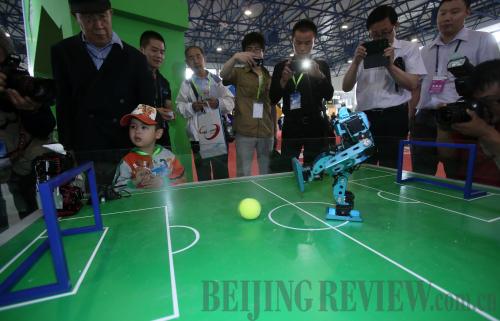 |
|
TECH GOALS: Visitors watch a robot play football at the 17th China Beijing International Hi-Tech Expo. The expo, held on May 14-18, attracted over 2,000 companies to display their latest technological breakthroughs (XINHUA) |
Diversifying Ownership
PetroChina, China's top oil and gas producer, announced on May 12 it will use part of its pipeline business to form a new company, which will then be sold as part of its mixed-ownership drive.
The new company will be based on assets and liabilities concerning the west-east gas pipeline managed by its pipeline subsidiary and all shares will be transferred after its establishment, according to a PetroChina announcement filed with the Shanghai Stock Exchange.
Total assets involved are estimated at over 82 billion yuan ($13 billion), with total liabilities of around 53 billion yuan ($8.42 billion) and net assets at 29 billion yuan ($4.61 billion), the announcement said.
PetroChina said the move will improve its distribution of resources and financing structure, as well as boost its mixed-ownership progress.
The new firm, which could possibly be called East Pipeline Co., will be established in Shanghai with registered capital at 10 billion yuan ($1.6 billion).
Customs Reform
China's General Administration of Customs (GAC) announced on May 14 that it will launch customs clearance reform in Beijing and Tianjin on July 1, which will be expanded to neighboring Hebei Province from October.
The GAC said the reform will unify customs clearance in Beijing, Tianjin and Hebei, through sharing a new information system of customs declaration, risk control, data checks and site work.
The reform will also cover sectors like supervision on tariff-free zones, cracking down on smuggling, business management and inspection, the GAC said.
The administration said the reform will make customs clearance more convenient in the area and local enterprises will be able to use the customs office of any of the three locations.
The reform will be promoted in other areas like the Yangtze River Delta and Pearl River Delta with faster economic development and frequent customs clearance, according to the GAC.
Narrowing Income Gap
The State Council said on May 14 that it has approved the establishment of an inter-ministry joint conference mechanism to coordinate income distribution reform.
The mechanism, led by the National Development and Reform Commission (NDRC), includes the ministries of education, science and technology, public security, civil affairs, finance, human resources and social security, according to a statement on the website of the Central Government.
Other ministries or departments in charge of land and resources, taxation, housing, state-owned assets supervision and administration are also members of the regime.
The joint conference, chaired by head of the NDRC, will be tasked with coordinating all work in deepening income distribution reform, such as in conducting policy studies, making policies and reform plans, and coordinating ministries involved in the reform.
The joint conference should monitor, track, assess and review the process of the reform before reporting to the State Council.
Its establishment is widely seen as a boost to the reform which is complicated and involves a wide range of government departments. | 